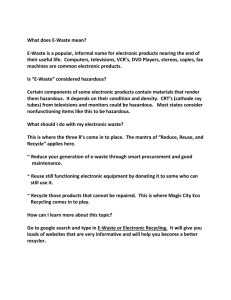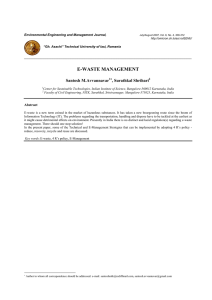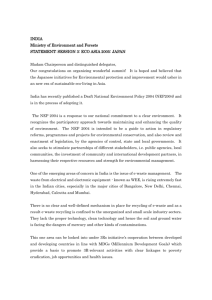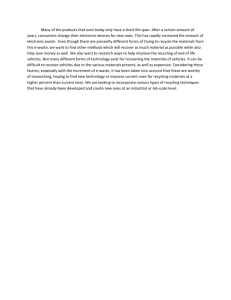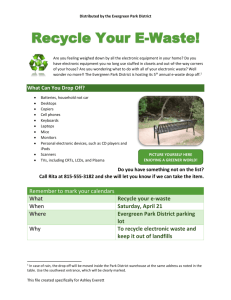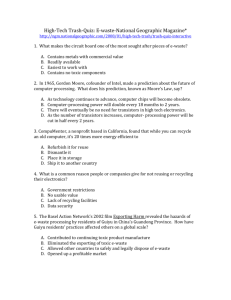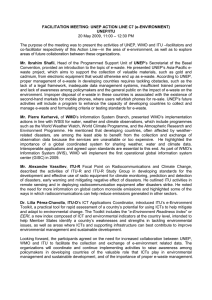ICT resource-efficiency and e-waste
advertisement
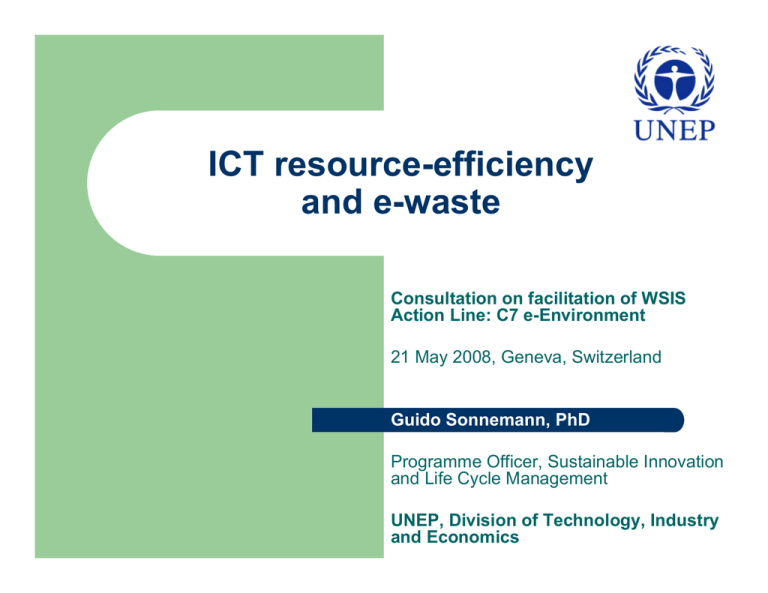
ICT resource-efficiency and e-waste Consultation on facilitation of WSIS Action Line: C7 e-Environment 21 May 2008, Geneva, Switzerland Guido Sonnemann, PhD Programme Officer, Sustainable Innovation and Life Cycle Management UNEP, Division of Technology, Industry and Economics UNEP and Resource Efficiency Midterm Strategy on Resource-Efficiency/ Sustainable Consumption and Production (SCP) z Division of Technology, Industry and Economics (Paris) z – – Sustainable Consumption and Production Branch International Environmental Technology Centre (Osaka) Marrakech Process/ 10-year Framework of Programmes on SCP facilitated by UNEP and UN DESA z OECD – UNEP Conference on Resource-Efficiency z International Panel for Sustainable Resource Management z UNEP-SETAC Life Cycle Initiative z UNEP E-Waste activities z Global e-Sustainability Initiative (GeSI) – – – – z Solving the E-Waste Problem (StEP) Initiative – – – z UNU facilitated multi-stakeholder Initiative Launched in 2006, now around 50 members UNEP in Steering Committee Resource Panel – Global Metal Flows Group – z UNEP/ITU ICT private sector partnership 23 Member Companies Launched 2001, Independent legal entity in 2008 UNEP co-chairs E-Waste Working Group Started recently to assess global metals flows, including metal recycling E-Waste Recycling Pilot Project in India/ Mumbai – – – Project from 2005-2007 Partnership with local and international NGOs E-waste manual Activities of the Secretariat of the Basel Convention • World Forum on E-waste - Organized on 30 November 2006 as part of COP-8 - Chaired by UNEP’s Executive Director Achim Steiner, who said: “Governments need to develop effective regulatory regimes that empower the market to respond positively to the challenge of e-wastes. By partnering with the private sector and with civil society, they can promote collection chains that channel obsolete goods back to their original manufacturers for recovery and recycling”. • Global Partnership on e-waste - Great advances made by the Asia-Pacific Programme in a short period of time • Mobile Phone Partnership Initiative (MPPI) - Launched in 2002, during COP-6 • Partnership for Action on Computing Equipments (PACE) - Currently being set up GeSI & e-waste - Progress to date z z Priority areas for collaboration identified: improving take-back efficiency and effectiveness Funding approved to re-launch UNEP co-chaired E-Waste Working Group – – – Enhance existing supply chain e-Tool and Audits to improve take back mechanisms and EoL management of e-waste Develop a roadmap to integrate E-Waste as a transversal issue in the work of other Working Groups Improve cooperation and coordination with other e-waste initiatives StEP Initiative and Resource Panel – Progress and Work plan z StEP Initiative – – z Task forces on Redesign, Reuse, Recycling and Capacity Building working and expected to deliver White Papers 1st Reuse Forum in September in Berlin Resource Panel – Global Metal Flows Group – – – Study on the stocks of metals in use Study on environmental implications of global metal flows Study on opportunities and challenges for metal recycling India project - Progress made z Mumbai-Pune Regional E-waste Assessment – z Informal Sector Networking & Training – z UNEP, MPCB and Toxics Link Asia Pacific Roundtable on Sustainable Consumption & Production (APRSCP) in Vietnam – z Organised by the Ministry of Environment & Forests E-Waste Awareness Campaign – z UNEP/ Indo-German-Swiss e-Waste Initiative Partnership National WEEE Legislation Workshops – z UNEP/ Maharashtra Pollution Control Board (MPCB) Partnership Session on Sustainable E-waste Management UNEP E-Waste manual Priorities for multi-stakeholder collaboration z z z z z z z Expand the work of the GeSI E-Waste WG (ICT Private sector and others) Set up PACE successfully with the Secretariat of the Basel Convention (Governments and others) Expand the work of the Resource Panel’s Global Metal Flow Group (Scientists) Set up a new e-waste pilot projects, probably in Cambodia (national and local authorities, informal sector, civil society) Work with the StEP Initiative in finalising the White Papers and other project ideas (Multi-stakeholders) Expand the e-waste topic into a material stewardship perspective going from extraction to EoL Improve cooperation and coordination among the various initiatives Metals required in eco-innovation Energy Generation, conversion, storage Energy use Heat, lighting, mobility, information Solar cell Fuel cell Battery Thermoelectric Motor Ga As In Cd Rn Pt Rh La Ce Gd Li Co Ni Bi Te Co Sb Dy Nd Sm Co B LED Ga In La Eu Y Electronic parts Ag Au Pd Rh In Ta W Ni Cleaning Catalyst Pt Pd Rh Source: Halada More information about UNEP’s work on ICT resource-efficiency and e-waste Guido Sonnemann, PhD Programme Officer, Innovation and Life Cycle Management United Nations Environment Programme Division of Technology, Industry & Economics Sustainable Consumption and Production Branch 39-43 Quai André Citroën 75739 Paris, Cedex 15, France Tel: +33 1 4437 1450 Fax: +33 1 4437 1474 E-mail: sc@unep.fr http://www.unep.fr/scp
